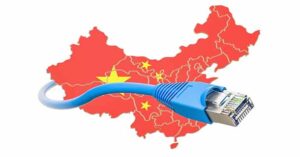China is using new technology in measures which are raising concerns that China is attempting to dominate the internet worldwide. They have installed three high speed operational 5G networks in Lhasa in Tibet, are developing a worldwide free internet system and are penetrating the fibre optic seabed cable systems that carry around 95% of the world’s internet traffic.
The high speed 5G system is up to 100 times faster than the 4G system that currently powers the internet. This 5G system can be used for facial recognition, spying and surveillance. Huawei, the Chinese multinational telecommunications equipment and consumer electronics manufacturer, opened an operational 5G system in February and installed facial recognition on Lhasa streets and in taxis in advance of March 10 – the day when Tibetans remember the uprising on that day in 1959 when the occupying Chinese shot and killed thousands of Tibetans.
The Times of India, in an article dated March 2, says that “experts believe the 5G system can be used for military purposes” – especially for weapons deployment and monitoring mountainous borders between India and Tibet. The Chinese maintain their purpose is simply to enhance communication for the local population, one local government official asserting that 5G technology can “help farmers enjoy modern, advanced communication systems”. However, the Times of India article goes on to point out that, “The low level of economic development in the Tibetan Autonomous Region may not require the world’s most sophisticated communication technology.”
In December 2018 China announced plans for Linksure, their new service which will provide internet access worldwide for free by 2026 via 272 satellites. On April 16 the Times of India reported that the first satellite was successfully launched; ten more are scheduled to go into orbit by 2020 enabling people with smartphones in remote areas to have internet access for free. According to Wikipedia, 56.1% of the world’s population has internet access; in the developed world this figure is 81%. Linksure will provide free internet access worldwide and could enable China to become the dominant provider worldwide unless the major internet giants offer the same.
The authoritarian approach China has used in Tibet to control internet content, distribute fake news and expand surveillance and espionage could thus be applied internationally, especially in developing countries. The 2018 Freedom House Report stated, “A confident Chinese President Xi Jinping proclaimed China is ‘blazing a new trail’ for developing countries to follow. It is a path that includes […] intolerance for dissent.” The report said that China, under new laws, is increasing censorship and surveillance while restricting online and mobile communication.
An example of how China works can be found in the article published in the Chinese Global Times, quoting Chinese state media Xinhuanet, on April 17, saying, “China’s Internet regulators have launched a special campaign to clean up instant messaging tools that are involved in spreading illegal information, fraud, and other malpractices. Authorities have closed the first batch of nine instant messaging tools…” The article continues, saying, “Some of them have severely threatened public security and undermined the legitimate rights and interests of Internet users.” It added that “the administration also encourages tip-offs on malpractices of instant messaging tools”.
China is also making inroads into the internet fibre optic global networks. Fibre cable systems on the ocean seabed carry about 95% of the world’s internet traffic. Now Huawei is seeking to embed itself into this system and is working on about 90 cable network projects. There are about 380 active submarine cables and Huawei has extensive knowledge of, and access to them.
Western countries, particularly the United States, are concerned about the vulnerability of submarine cables to surveillance, espionage or attack. By law Huawei is required to assist Chinese intelligence operations. Should Huawei attach devices that could monitor or divert network traffic, or cut or destroy cables, it would have worldwide impact, as reported by the Business Standard on March 13, “Britain’s national security advisor, Mark Sedwill, told a parliamentary hearing in 2017 that attacks on undersea cables could have “the same effect as used to be achieved in, say, World War II by bombing the London docks or taking out a power station”.
In the United Kingdom, the BBC reports that the “government has approved the supply of equipment by Chinese telecoms firm Huawei for the UK’s new 5G data network despite warnings of a security risk”. The report goes on to say that the United States “wants its allies in the ‘Five Eyes’ intelligence grouping – the UK, Canada, Australia and New Zealand – to exclude the company”, citing “serious concerns over Huawei’s obligations to the Chinese government and the danger that poses to the integrity of telecommunications networks in the US and elsewhere”. Australia has said it is siding with Washington.





 Print
Print Email
Email